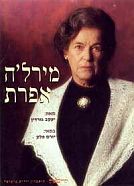

“Mirele Efros” Staged Yiddish Play Reading
Tuesday, December 3, 2013, 7:00 pm PST - 8:30 pm PST
| Free“Mirele Efros”
Seattle premiere of the Yiddish theater classic
Written by Jacob Gordin
New English translation by Nahma Sandrow
Directed by Art Feinglass, artistic director, Seattle Jewish Theater Company
Staged reading presented by the UW Stroum Center for Jewish Studies
and
the Seattle Jewish Theater Company
Tuesday, December 3rd 2013, 7:00 – 8:30 p.m.
The Ethnic Cultural Theatre
3940 Brooklyn Ave. NE (on the corner of Brooklyn Ave. and NE 39th St.)
Mirele Efros, called “the Jewish Queen Lear,” is a tale of power and pride. The masterpiece of Ukrainian-born Jacob Gordin, a hugely influential Yiddish playwright, it was the most widely performed play in the Yiddish theatrical canon.
This classic of Yiddish theater recreates Jewish life in nineteenth century Grodno, Poland. The title character Mirele is a wealthy and pious widow whose devotion to her children extends to hand-picking a wife for her eldest son. She gravely mistakes the young woman’s character and a conflict soon erupts between the Jewish matriarch and her daughter-in-law who schemes to gain control of the Efros family wealth. More than a folkloric play, it captures the drama of a power struggle between generations and between the old world and the new. Gordin, one of whose political causes was women’s rights, takes as his central figure a woman who struggles, falls, and rises wiser than before.
The title role was performed by every leading Yiddish actress during the heyday of Yiddish theater in New York City. The play was created by the author as a vehicle for one actress; when another star with her own following first attempted the title role, the Yiddish public was riveted by this battle of titans, and newspapers published reviews and even cartoons commenting on the dueling prima donnas. Yiddish actresses continue to measure themselves in the role, as recently as 1967 (Warsaw and New York), 1996 (Montreal), 2003 (Tel Aviv) and 2009 (Bucharest).
In addition to Yiddish, Mirele Efros has been performed in Russian, Ukrainian, Hungarian, German, Spanish, Italian, and Hebrew. This new English translation by Yiddish scholar Nahma Sandrow will be performed for the first time in Seattle.
